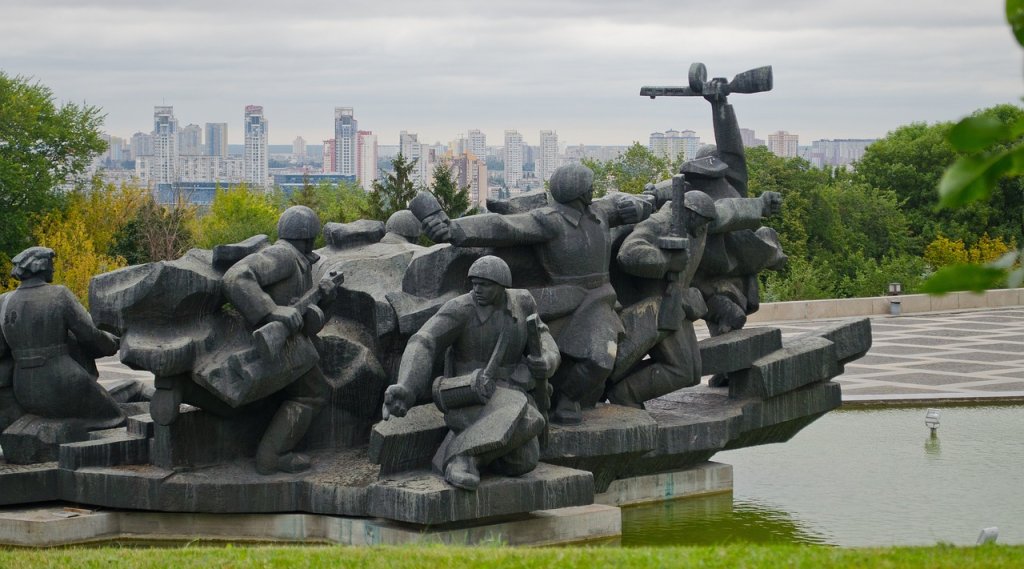
High-intensity battles continue in the frozen trenches crisscrossing Ukrainian cities of Avdiivka and Bakhmut, but neither side is able to gain more than a few dozen square meters. The word “stalemate” was spelled in the article written by Ukrainian Commander-in-Chief General Valery Zaluzhny, and it triggered an avalanche of commentary on the causes and consequences of the apparent evaporation of the prospect of a decisive Ukrainian victory. Zaluzhny’s remarkably honest argument is about the changes in strategy than are necessary for winning the long war of attrition, but many commentators, including such influential experts as Richard Haass and Charles Kupchan, have interpreted his narrative as a confirmation of the failure of Western policy of arming and funding Ukraine – and suggested opening peace talks with Moscow before Russia gains a decisive advantage.
This pensive retreat from the firmly declared stance on supporting Ukraine for “as long as it takes” is eagerly referenced by Moscow pundits as proof positive of Western discord and fatigue with the high costs and low returns of confronting Russia’s power projection. In fact, this new spike of debates in the broad coalition of Ukraine’s friends and sponsors reflects the recognition of the possibility of juxtaposing various options, since the long war has opened wider space for political contestations, normal and even necessary in democratic states. Priority granted to helping Ukraine in its struggle against the Russian aggression remains high, but it is inevitably compared to and enmeshed with other priorities, foreign and domestic.
This convolution of political agendas is happening both in the USA and in the EU, two main sources of aid to Ukraine, and further complications in both Washington D.C. and Brussels are added by the intractable conflict in Gaza, which demands urgent attention. Political battles in the two parts of the Transatlantic alliance are temporarily suspended for the season of festivities, but the resumption is certain, and the differences in the content of disagreements are set to come in a sharper focus.
It is the presidential election campaign – waged with greater passion and bitterness than ever before – that affects the decision-making in the US Congress on the aid package, which includes funding not only for Ukraine, Israel and Taiwan, but also for stricter control of the border with Mexico. The problem is that neither the Republican caucus in the House of Representative, led by inexperienced speaker Mike Johnson, nor the Biden administration, attentive to the voices in the left wing of the Democratic party, can develop a feasible plan for managing the border issue. Technicalities may bedevil the bargaining, but the fundamental matter is that the support for Ukraine continues to rely on solid bipartisan support, so the prospect of approval remains positive.
In the EU, the question of funding for Ukraine appears more straightforward, but may actually turn out to be more complicated. Hungary blocked the decision on the 50 billion aid package at the EU Council summit on December 14-15, so the heads of states will have to gather again in January and find a way to overcome this veto. They may succeed, but the parallel issue of Ukraine’s accession to the EU, in which a “historic breakthrough” is celebrated, is certain to hit many tall hurdles. The fact of the matter is that a profound reform of EU institutions is necessary for incorporating Ukraine, loaded with problems of immense scale, and far greater difficulties than just disagreeable Viktor Orban are set to block such reform. Nevertheless, the immediate problem of ensuring the flow of military and economic aid to Ukraine will most probably be resolved, redoubling the support coming from the US.
Another significant source of funding for Ukraine’s efforts at rebuilding its economy while sustaining the war effort is the financial assets of Russian Central Bank, roughly estimated at $US 300 billion, which are “frozen” in various Western banks – and are under examination for possible utilization. Even a tithe of these hoards added to the aid packages to be approved by the US and the EU will make a big difference in the strategic outlook for 2024. President Vladimir Putin tries to radiate confidence about the course of the confrontation with the West, but the decisive factor in the long war of attrition is the economic might and ultimately – the money, and Russia cannot possibly match the collective strength of the coalition backing Ukraine.
Russian top brass and government bureaucracy may supply Putin with carefully doctored data and self-serving assessments, but the real picture of Russia’s economic performance is far from steady recovery. The military-industrial complex has reached its maximum output with general allocation of budget resources, but the deterioration of key assetsand curtailed access to modern technologies determine a protracted decline in production of key weapon systems. Reports about accidents and explosions seep through the censorship, and the main cause typically is human error rather than Ukrainian saboteurs. European capacity for producing artillery shells is expanding slower than needed, but it is set to increase, while the inevitable contraction of Russian output cannot be compensated by the import from North Korea.
Moscow’s best hope for keeping the war machine running is an increase in petro-revenues, but in reality a contraction is in progress, and every tightening of sanctions compels Russian companies to sell oil cheaper. Seeking to reassure the partners in the OPEC+ cartel, Putin made a rare visit to the UAE and Saudi Arabia, but the Gulf producers are disappointed in Russia’s inability to contribute to the deal on reducing the production quotas. Even the disruption of maritime traffic in the Red Sea has caused only a minor increase in the benchmark oil price, and the deployment of the US-led naval coalition is set to deal with this challenge.
Economic impacts are accumulating gradually, but their complex balance is shifting inexorably against Russia’s strategy of prevailing in the long war. A deadlock in the military operations is usually interpreted by external stakeholders as an opportunity to offer mediation toward peace talks, but it is clearly not the case in the present phase of the Russia-Ukraine war. China may have better information about Russian economy than the Kremlin, and so President Xi Jinping prefers to wait with re-launching his peace plan. Türkiye has gained a perfect position to mediate between Moscow and Kyiv, but Putin’s ambitions and delusions are no secret for Ankara, and those are not conducive to forging a compromise. It will take a turn of tide in the course of war to create an opportunity for a peace initiative, and Ukraine has good reasons to expect such change of fortunes in its favor in the coming months.

Pavel K. Baev, Dr., Peace Research Institute, Oslo (PRIO)
Dr. Pavel K. Baev is a Research Professor at the Peace Research Institute, Oslo (PRIO). He is also Senior Non-Resident Fellow at the Center for the U.S. and Europe at the Brookings Institution (Washington D.C.), Senior Associate Researcher at the Institut Français des Relations Internationales(IFRI, Paris), and Senior Associate Research Fellow at the Italian Institute for International Political Studies (ISPI, Milan). His research interests include the transformation of the Russian military, the energy and security dimensions of the Russian-European relations, Russia’s Arctic policy, Russia-China partnership, post-Soviet conflict management in the Caucasus and the Caspian Basin, and Russia’s Middle East policy, which is supported by the Norwegian Foreign Ministry. He writes a weekly column in Eurasia Daily Monitor.
To cite this work: Pavel K. Baev, “Stalemate amplifies political resonance of the Ukraine War”, Panorama, Online, 29 December , https://www.uikpanorama.com/blog/2023/12/29/stalemate
Copyright@UIKPanorama. All on-line and print rights reserved. Opinions expressed in works published by the Panorama belongs to the authors alone unless otherwise stated, and do not imply endorsement by the IRCT, Global Academy, or the Editors/Editorial Board of Panorama.

